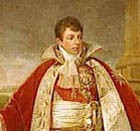Duroc (Géraud-Christophe-Michel, Duc de Frioul), General from 1772-1813. Duroc embarked on a military career as a cadet at the beginning of 1789. He was driven out of the army and then emigrated in 1792, however he soon returned to France and reassumed his military career. After having been promoted to Lieutenant of Artillery in 1793 (he was present at the Siege of Toulon) he served in the Armée d'Italie until 1798 under Andréossy in the sapper corps (corps des pontonniers), distinguishing himself notably at Primolano, (4 September, 1796), later becoming one of General Bonaparte's ADCs. In 1798-1799 he was in Egypt where he fought in combat in Salahieh, then in Jaffa and in Acre, where he was wounded. Having returned to France with Bonaparte, he participated in the Brumaire coup d'état and became the First Consul's Premier Aide-de-Camp.
He then undertook diplomatic duties in Berlin and in Basel and fought at the Battle of Marengo in 1800. He carried out further missions in Vienna, St Petersburg and Copenhagen. He was promoted to General de Brigade in October 1801, and then Général de Division two years later, finally becoming Grand Maréchal du Palais in 1805. From 1805 to 1807 he served in the Grande Armée in Austria, Prussia and Poland. At Austerlitz he became provisional head of the Oudinot's grenadier division and then negotiated the Treaty of Schönbrunn with Prussia. He was seriously wounded in a carriage accident in Poland at the end of 1806, but recovered in time to bear armistice proposals to the Tsar after the Battle of Friedland (June 1807). He was elevated to the rank of Duc de Frioul the following May. In Bayonne in 1808 he received from the King of Spain the latter's abdication and then proceeded to accompany Napoleon to Erfurt and, at a later stage, to Spain. He was also at the Emperor's side during the Campaign in 1809, fighting at Essling and Wagram and negociating the armistice of Znaim (12 July, 1809). He played a role in the Russian and Saxon campaigns in 1812 and 1813 respectively and fought at Lützen and Bautzen. Wounded by a cannonball near Görlitz (in Silesia) on the 22 May, 1813, he survived just long enough to receive a last visit from Napoleon. The Emperor valued highly this loyal and efficient subordinate, skilful negotiator and worthy soldier.
Jean Tulard (ed.), Dictionnaire Napoléon, Paris: Librairie Arthème Fayard, 1999 (second edition), pp. 692-3, s.v., ‘Duroc'.
At seven o'clock in the evening of the 22, the Grand-Maréchal Duc de Frioul was on a small hill talking with the Duc de Trévise and the General Kirgener, all three of them dismounted and out of gunfire range. One of the last of the enemy's cannonballs grazed the Duc de Trévise, split open the lower abdomen of the Grand-Maréchal, and left General Kirgener stone dead. The Duc de Frioul immediately sensed that the blow was mortal; he died twelve hours afterwards. As soon as the posts were placed and the army had taken to their bivouacs, the Emperor went to see the Duc de Frioul. He found him fully conscious and showing the upmost self-control. The Duc took the hand of the Emperor, which he brought to his lips. All my life, he said, has been devoted to your service, and I only regret that, to you, it cannot be of any further service! Duroc, said the Emperor, in another life time! It is there where you will wait for me, and there where we will meet again. – Yes, Sire, but this will be in 30 years time, when you will have triumphed over your enemies and carried out all the hopes and desires of our homeland. I have lived as an honest man; I have no regrets. I leave a daughter, your Majesty will treat her as your own. The Emperor, after taking the Grand Maréchal's right hand, stayed a quarter of an hour with his head resting on his left hand amidst the most profound silence. The Grand-Maréchal was the first to break the silence: Oh Sire! Go! This sight troubles you! The Emperor, leaning on the Duc de Dalmate and the Grand Écuyer, left the Duc de Frioul unable to say anything but these words: Farewell, thus, my friend! His Majesty went back to his tent, and received no-one throughout the entire night.
Le Moniteur 1813, volume 1, N.150, dimanche 30 mai 1813, p.586.


